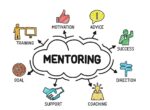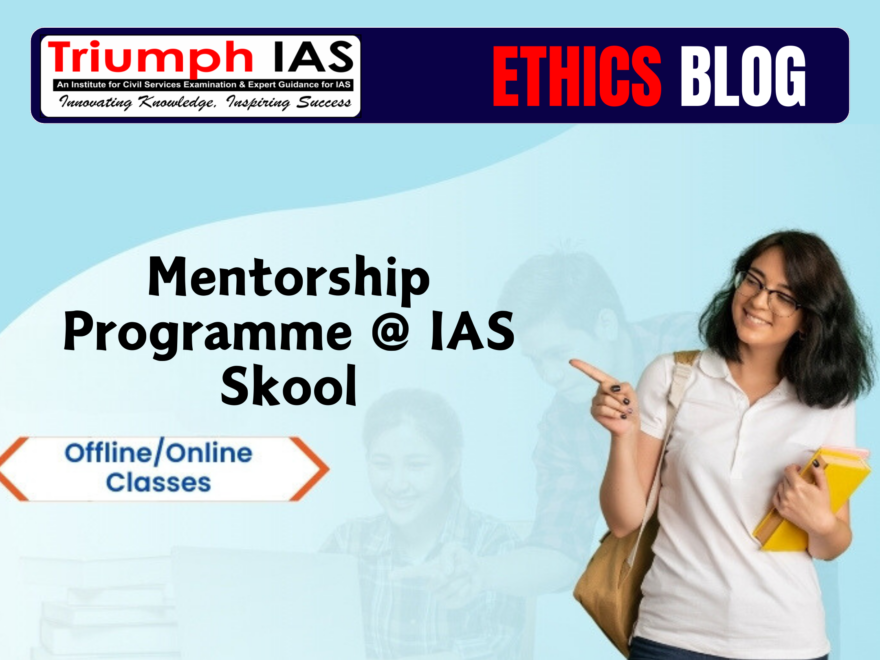
Mentorship Programme @ IAS Skool
[Relevant for Public Ethics, Integrity and Aptitude]

Mentorship Programme @ IAS Skool
IAS Skool – a sister concern of Triumph IAS
“Our chief want in life is somebody who will make us do what we can.” — Ralph Waldo Emerson
More than that, if we can add to what the American humanist has said:
…And that “somebody” should never judge us for our shortcomings rather make them our stepping stone to success.
Mentoring for UPSC with a new Paradigm
Mentoring has become essential for UPSC exams not because you know less but because you are trapped in information-load and do not know how to process that information into something called “knowledge”.
UPSC is an exam where your knowledge is tested and thus it becomes important that you know the art of organizing all that you know into something that sounds coherent and meaningful.
It is essential to know that you have to answer the question and not share or show all that you know to the examiner. One word in the question can change the whole articulation style and narration format required from you to “really” answer that particular question.
Now, a question before we discuss further.
Why in GS paper your score is not as per all the information that you have? And the second one to this question is: why your score varies so much every time you write exam?
Objectifying the key words required for an answer and presenting the whole write-up in a rhythm with extrapolating the concurrent discourse into the theoretical concept that is asked in any question is the “masterkey”. Optimizing your information what we call as Qualitative Quantification with that “wisdom” is called-for in this exam.
Mentoring – It’s a need-based approach specific to ‘that’ student aptitude
Every student is different and that is quite natural as every human is unique in his/her own way; so, one cannot have a stereotypical approach involving a generalist manner to actualize the potential each one has.
Rather, a niche, a specific approach is needed for every student where he/she can minimize their shortcomings and maximize their strength.
Some students have a command over language while others are average with their linguistic skills.
Both these categories need to be mentored in very different manner with the choice of prioritizing what needs to be written for the paper. It would be better if the former category goes for sentence-paragraph format and the latter category goes for bullet format with pictographically representing all that remains unsaid.
Similarly, there are ways in which you understand and appreciate how to make:
- interdisciplinary approach
- inter-domain approach
- making every question relevancy for the concurrent time but not missing out with the concepts asked-for i.e. inter-temporal understanding behind every question.
In a nutshell, it always pays if you can appreciate the question by enlarging its contours at the beginning of your answer and coming out with a feasible assessment of the same as your concluding lines.
And, not to forget that Your Syllabus is your Bible and you have to treat each and every word of the Syllabus as your track-line and you have to constantly drive your “knowledge-train” on those tracks otherwise there are all chances of derailment. This is the most common and thus the biggest issue among all candidate who missed their “destination” for the simple reason that their “train” got derailed.
One of the underlying and emphatic characteristics of this Mentorship Programme is to forewarn you and not to let you “derail”.
IAS Skool – Mentorship
- Every Mentee would be provided with daily worksheet to make him/her disciplined
- Emphasis on your individual way of writing answer and how that could be fine-tuned for UPSC
- Newspaper analysis and making you “liberated” of unmindful collection of useless information
- Mentor would make you qualitatively distinct rather than being run of the mill quantitative reproduction thus becoming mere information-machine
- Mentor would make you a creative thinker; a Sovereign entity full of self-ownership and confidence
- Mentor-mentee relation would be more than a mere teacher-student relation. It would be like a guru-shishya where all the perceived ‘darkness’ of shishya would be shown to him in a different perspective. Seeing your perceived shortcomings with a Sovereign mindset is like making that shortcoming your biggest strength.
Remember, UPSC is all a game of perception and mindset.
The gist of this programme could be summed up in the following lines:
A mentor is someone who sees more talent and ability within you, than you see in yourself, and helps bring it out of you.
With this I being a faculty of Ethics paper would recommend that you all are welcome to get yourself enrolled for this programme by calling at the centre or coming in person.
For mentoring we shall be open both in online and offline mode.
For the first batch, we intend to take 200 students only and to make the whole thing limited to 200 we shall conduct a selection test from which we shall select 100 female and 100 male students representing a pan-India demographic status as far as the UPSC aspirants crowd make. So, we shall have students from both rural and urban, north and south, east and west, metro and non-metro, convent educated and government school run, working and non-working in a proportion which truly represents the population of the UPSC aspirant crowd.
The test shall be conducted just after the Navratri.
So, please come and enrol for the same for this mentoring is not mere extension of that classroom feeling rather it would be like a relation between teacher and student which has metamorphosed into that of guru-shisya.
#EthicsBlogoTerms
Related Blogs …
Follow us :
🔎 https://www.instagram.com/triumphias
🔎 https://www.youtube.com/c/TriumphIAS
🔎 https://t.me/VikashRanjanSociology
Find More Blogs…
| What is the Pedagogy of Ethics? | Cultural And Ethical Subjectivism |
| Diplomatic Relations | Different Schools of Philosophy for International Ethics |

